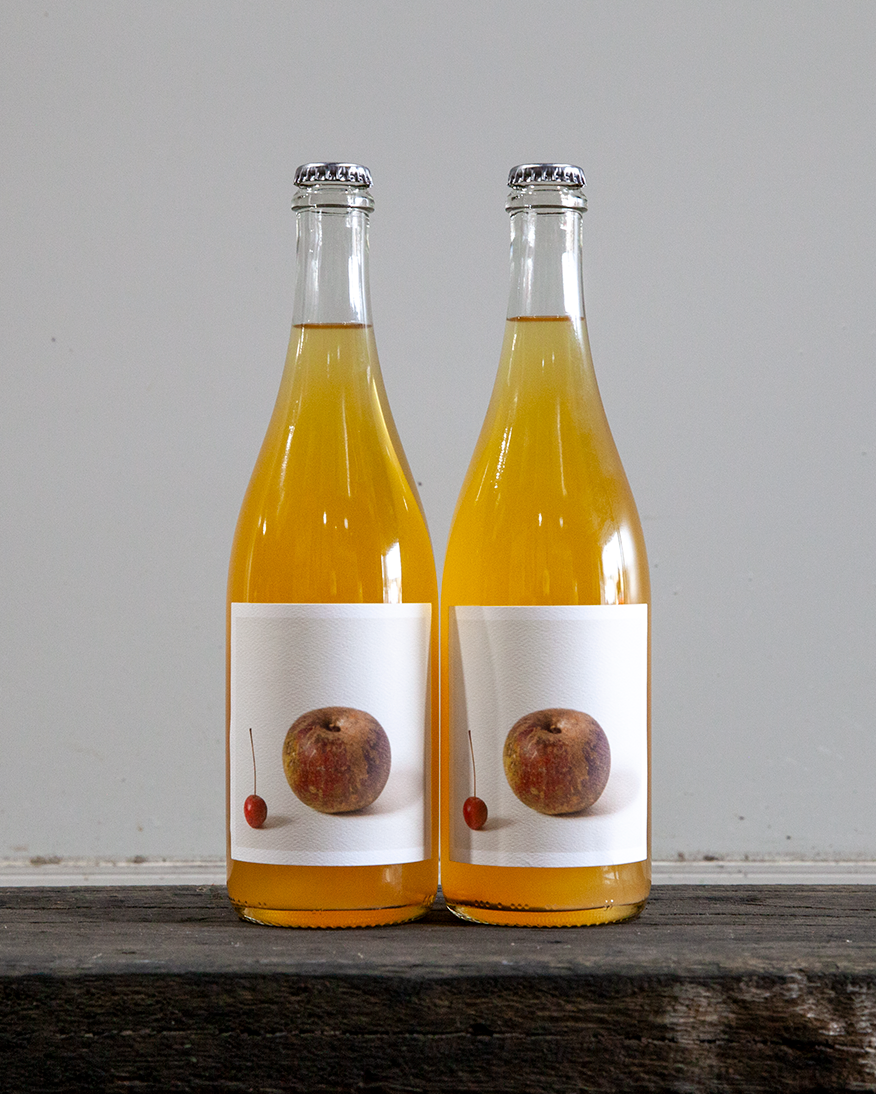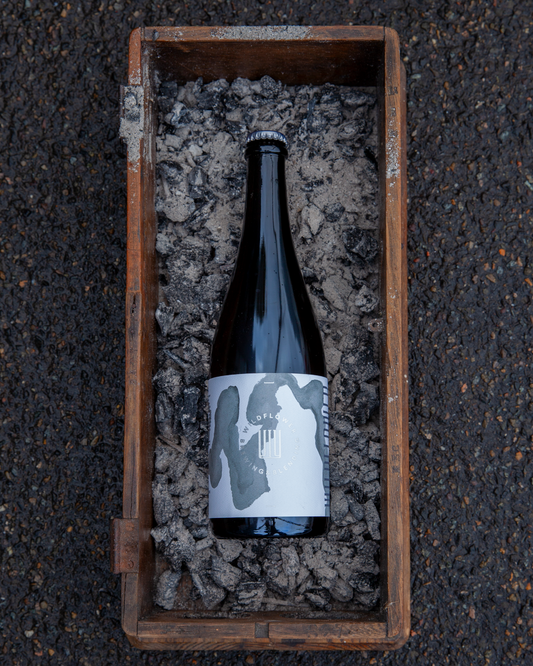We are very excited to announce that Roadcider 2023: Orange will be available online and for tasting and take-away/collection at our cellar door from 12pm (AEST) on Friday 4 August 2023.
Roadcider is a collaborative project with my friend and fermentation guru, Lucien Alperstein. We have made cider together since 2018 at Wildflower but very much his creative direction and drive. The following text is written by Lucien, no surprises why we get on.
Lucien's notes
This cider has been a long time coming. Roadcider Orange is our first release to ever use apples deliberately planted and grown in an orchard. And what rare and beautiful apples and what an orchard.
But first, a primer on apples. There are around 15 varieties of apples grown in Australia commercially, which sounds like a lot, but compared to the roughly 7500 named varieties of apples across the world, and an estimated 30,000 varieties in the world in total, 15 is a pretty small slice of the pie.
Some cider-makers classify all apples into 4 key categories: sweet, sharp, bittersweet and bittersharp. Sweets are self-explanatory - every commercial apple you can buy (except Granny Smith) is a sweet apple. Sharps are acidic - Granny Smith is a good example but in the cider world it's only a baby, mild sharp. Bittersweet and bittersharp apples are named so because they contain tannin - the same drying, astringent family of molecules found in some unripe persimmons, quinces and of course grapes.
Traditional cider is made largely from the sharp, bittersweet and bittersharp categories, where historically the sweet apples would be eaten. Making cider with sharp and bitter apples adds a whole layer of weight, mouthfeel and length to a cider that's almost impossible to achieve without them.

The story of working with an orchard starts with foraging roadside fruit. When I started foraging roadside apples to make cider in 2014 I fell in love with the wonderful world of apple varieties. There is a huge diversity of roadside fruit, from sweet and aromatic to extremely acidic to tannin-heavy. Roadside apples are so diverse because apples don't resemble their parents - if you plant a Granny Smith seed you don't get anything close to a Granny Smith. For me, finding roadside apples catapulted me into the study and research of apple varieties. I am so endlessly fascinated by this and struggle to put into words how much I love it. Part of the joy of making cider from roadside trees is the unknown - which trees will fruit well this year? What new trees will we find? How will the blend we pick come together? An old tree becomes an old friend. There's an element of chance that makes it impossible to know how the cider will come together until all the fruit is picked, and makes the year-on-year variation exciting and a big part of the story.
At the same time, I was curious to try some of the historical "true cider varieties" I had read about, but struggled to find anyone growing cider-varieties and focussed on roadside fruit. I put the idea of finding cider-variety fruit to bed for nine years until I got in touch with the only person I know who loves apples more than I do, cider-apple pioneer David Pickering, who connected me with Borrodell Orchard.
Gaye Stuart-Nairne and the late Borry Gartrell planted and grafted hundreds of varieties of apples at Borrodell, just outside of Orange at the foot of Mount Canobolas many years ago, including a very healthy selection of cider-variety apples. With a couple of hundred varieties of apples, maybe more like 300, it's one of the most diverse apple orchards in the country.
Working with cider-variety apples from Borrodell Orchard allows for a different kind of making process, one where we're trying to choose blends that work well together, where year-on-year we'll be able to play with balance, try things over again and hone our ciders. Finding cider-variety apples on this continent is extremely rare. Borrodell grows some of the most revered cider-variety apples available in the world. Bittersharp and bittersweet varieties like Kingston Black, Yarlington Mill, Somerset Redstreak, Dabinett, Frequin Rouge and Fréquin Tardive de la Sarthe. Sharps including Browns Apple and Bramley (also the most revered apple pie apple in the UK, with enough acid to balance a sweet pastry and plenty of clotted cream). Sweets including Roxbury Russet, Esopus Spitzenburg and Golden Harvey.

Roadcider 2023
This year we worked with later-harvest varieties - primarily Kingston Black, Dabinett, Somerset Redstreak and Bramley, with a handful of others rounding out the blend. Dabinetts are known for adding some spicy, smoky character as well as helping bump up the ABV. Kingston Black, sometimes referred to as the perfect cider apple because of it's rich flavour and balance of acid, sugar and tannin, provides depth. Somerset Redstreaks have a beautiful balance of acid and tannin and had the most heady, floral smell that made me think a tree nearby must have been flowering out of season. Working with these beautiful varieties is new for us, so working out exactly what blend to pick and which apples lend which characteristics to a finished cider will be an ongoing process.
Natural fermentation kicked off with a pie de cuvee (the winemaking equivalent of a sourdough starter) and finished completely dry. It's come in at a healthy 8.2% ABV. Secondary fermentation in bottle has given it a healthy level of carbonation, which plays nicely with the lightly drying, tannic finish. Wine-drinkers not familiar with more traditional dry, sparkling cider should think "skin contact pet nat" more than "regular cider". There's no sweetness, and though there is definitively some apple character shining through, there's a lot of complexity and depth here too.
******
There is a small part of me that still feels like making cider from an orchard rather than the side of the road feels like cheating on Roadcider. We're still foraging fruit and making actual-side-of-the-road-roadcider. At the same time, being able to branch out and make cider from rare, beautiful fruit and share it with you feels like the natural next step for Roadcider - Lucien Alperstein 2023.




